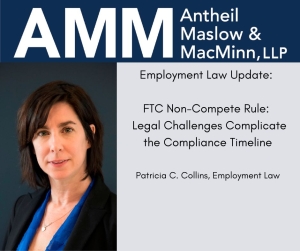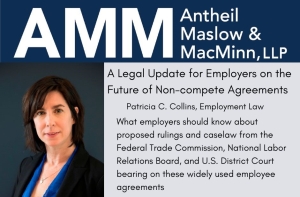FTC Non-Compete Rule: Legal Challenges Complicate the Compliance Timeline
Reprinted with permission from the June 8th edition of The Legal Intelligencer. (c) 2024 ALM Media Properties. Further duplication without permission is prohibited.
On April 23, 2023, the Federal Trade Commission (“FTC”) issued a final rule imposing a broad restrictions on non-competition agreements (“Final Rule”). The Final Rule requires employers to rescind existing non-compete agreements, and preempts conflicting state laws. The Final Rule is effective on September 4, 2024. In the meantime, there were three cases filed (one of which has been dismissed) that may result in a stay of implementation of the rule. This creates uncertainty for employers and employees in preparing for the effective date of the Final Rule. The Final Rule dramatically impacts both employers and employees. Employees subject to these agreements, and contemplating a move, may be waiting for September 4, 2024 to make decisions. Employers must prepare to determine to whom they will send rescission notices, and what steps they will take to ensure protection of trade secrets and customer relationships.
The Final Rule defines “non-compete clauses” as follows: any agreement that prevents a worker from, or penalizes a worker for, seeking or attempting to seek employment with any employer after the termination of their current employment. The Final Rule mandates that it is a prohibited unfair method of competition to enter into or “attempt to enter into” a non-compete clause with an employee, or to enforce an existing non-compete agreement, or to represent to an employee that they are subject to a non-compete without a good faith basis to believe they are.
The Federal Trade Commission's Campaign to Eliminate Non-Competes
Reprinted from the October 18th edition of The Legal Intelligencer. (c) 2023 ALM Media Properties. Further duplication without permission is prohibited.
On January 5, 2023, the Federal Trade Commission (“FTC”) issued a proposed final rule that would result in a ban of non-compete agreements, and would require employers to rescind existing non-compete agreements. The public comment period for the rule terminated on April 19, 2023, but the FTC has acted aggressively to ban non-competes in the meantime. The FTC has filed complaints against companies that use non-compete agreements, resulting in consent orders that accomplish the recission of hundreds of existing non-compete agreements. The United States Department of Labor, the National Labor Relations Board and even the courts have also taken steps to deter the use of non-compete agreements.
The Federal Trade Commission’s Proposed Ban On Non-Competes
Reprinted from the February 10th edition of The Legal Intelligencer. (c) 2022 ALM Media Properties. Further duplication without permission is prohibited.
On January 5, 2023, the Federal Trade Commission (“FTC”) proposed rules imposing a broad restriction on non-competition agreements (“Proposed Rule”). The Proposed Rule would require employers to rescind existing non-compete agreements, and would preempt conflicting state laws. The ban marks a dramatic change not only in the law, but in the relationship between employers and their key employees.
The Proposed Rule defines “non-compete clauses” as follows: any agreement that prevents a worker from seeking or attempting to seek employment with any employer; or, any agreement that is a de facto non-compete clause. A de facto noncompete clause has the “effect of prohibiting the worker from seeking or accepting employment.” The Proposed Rule provides examples of a de facto non-compete clause: a non-disclosure agreement drafted so broadly that it effectively precludes the employee from working in their chosen field; or a contractual term that requires the employee to pay the employer or a third party its training costs if employment terminates within a specified time period, but only where the payment is not reasonably related to the actual costs incurred by the employer.
The Proposed Rule mandates that it is a prohibited unfair method of competition to enter into or “attempt to enter into” a noncompete clause with an employee, or to maintain an existing non-compete agreement, or to represent to an employee that they are subject to a noncompete without a good faith basis to believe they are.
No Hire Clause Called into Question
Many companies use restrictive covenant agreements with key employees to guard against economic harm to the company by an employee who takes a job with the company’s competitor and/or tries to persuade the company’s customers to stop doing business with the company. These are particularly common with sales staff. In Pennsylvania, these covenants will generally be upheld if they are narrowly drawn to protect the employer’s legitimate business interests and if the employee has been given meaningful consideration in exchange for agreeing to be bound by the covenants. To learn more about Noncompetes, visit our Navigating Noncompetes blog series in the AMM Employment Law Blog.
Companies recognize that merely doing business with other firms can also be risky when it comes to protecting their interests in employees and customers. Consequently, it has become customary to include “no hire” provisions in contracts to prohibit a party from hiring away the other party’s staff. These clauses are particularly common in agreements in the technology field and in non-disclosure agreements that parties often enter into when evaluating whether or not to begin a business relationship. The viability of these provisions is in doubt in Pennsylvania, where the Pennsylvania Superior Court struck down a no-hire clause in a service agreement earlier this year. The Pennsylvania Supreme Court has agreed to hear the case.
In Pittsburgh Logistics Systems, Inc. v. BeeMac Trucking, LLC, the trial court held that the no-hire clause was unenforceable because it prevented individuals from seeking employment with certain companies even though those individuals had not agreed to or been compensated for the restriction. It is important to note that in a separate action, Pittsburgh Logistics Systems (“PLS”), the company attempting to enforce the restrictions against BeeMac, was unsuccessful in its efforts to enforce the restrictive covenants contained in four employees’ employment agreements, each of whom left to work at BeeMac. The trial court concluded that the covenant not to compete was oppressive and overly broad since it had an unlimited geographic scope. The court viewed PLS as having “unclean hands” and refused to enforce the restriction at all.
The Superior Court agreed with the trial court and held that the no-hire clause was unenforceable as a matter of law. The Superior Court was influenced by the lower court’s holding that the non-compete covenants in the employment agreements were not enforceable, noting that it would be unfair for PLS to achieve the same result by using a contractual no-hire provision in its contracts with other companies.
Two Superior Court judges dissented, drawing a distinction between a no-hire provision in a contract between two companies and a non-compete clause binding employees. They reasoned that the no-hire clause did not restrict the employees’ actions; rather, the clause was a bargained-for restriction in recognition of the fact that BeeMac would have access to PLS employees and know-how. The dissenting opinion suggests that the correct analysis is whether the no-hire clause was a reasonable restraint on trade. Using that test, the dissenting judges would have enforced the clause and granted the injunctive relief requested by PLS to prevent BeeMac from “enjoy[ing] the benefit of its purported breach” and “leverag[ing] the specialized knowledge that PLS’s former employees acquired while under its employment.”
It will be interesting to see how the Pennsylvania Supreme Court views these issues when it hears this case. Stay tuned for further developments.
Navigating Noncompetes Part III: Employees, the Restricted Parties
In the last segment of this series, we focused on concerns for employers in drafting and enforcing restrictive covenants. The choices for employees are fewer, and none of them are good. Employees are generally asked to sign restrictive covenants at two points: either at the beginning of their career or upon a promotion or other significant improvement in employment status. Such agreements diminish employees’ choices should they want to move on from their current employment, whether or not the restrictions are actually enforceable.
Some employers require employees to sign a restrictive covenant at the outset of their employment. If the employee was recruited and has other employment choices, the employee has some bargaining power to reduce the duration or scope of the restrictions. But this is seldom the case, and the law recognizes that employees generally have limited (or no) bargaining power in these situations. The law disfavors restrictive covenants for precisely this reason: the agreement imposes a post-employment restriction that may hinder the employee’s ability to earn a living at a time when the employee has little or no bargaining power to negotiate the restriction.
This calculus changes a little when the employee is required to sign a restrictive covenant in conjunction with a promotion or other benefit, such as participation in a stock option or bonus program. Then the employee has to decide whether the value of the promotion or other benefit is enough to justify agreeing to the post-employment restriction. Where it is not, the employee can refuse to sign, forcing the employer to decide how valuable this employee is to the employer. However, the employee should factor into this decision that the employer is free to terminate the employee for refusing to sign. And, this might be a good thing, as the employee will be leaving the employer without a noncompete.
Frequently, employees breach the restriction without consulting an attorney first based on the widely held, mistaken, belief that courts do not enforce noncompetes. Let’s be clear: courts will enforce noncompetes where the law permits them to do so. More importantly, the old employer will sue the employee and the employee’s new employer for breach of the agreement. The new employer may terminate the new employment to avoid the costs of litigation. Litigation regarding these matters is expensive, time-consuming and stressful. Practically speaking, most employers will refuse to hire an employee with a restrictive covenant even if it is unenforceable for any number of technical reasons we have discussed in this series.
At the very least, employees should consult an attorney prior to signing, even if they have limited bargaining power, to understand the restrictions in place. We can help employees with that review, and we can help employees navigate the minefield of finding new employment when they have a noncompete in place.
Navigating Noncompetes Part II: What Employers Should Consider
Part 2 of our Noncompete Series will focus on employers. Noncompetes, when well drafted, are a powerful tool to protect customer relationships, confidential information, trade and training secrets, and key employee relationships. But, the law does not favor these agreements, so drafting requires care, and, as a practical matter, timing is everything.
While noncompetes are disfavored and maligned, they do serve useful purposes for certain employers. There are two types of restrictions that such agreements can impose: general prohibits on certain kinds of competition; or, prohibitions on soliciting customers, vendors, employees, contractors, or other valuable relationships. For the most part, restrictions on soliciting customers, employees and other key relationships are easier to enforce. They allow the employee to continue to work, and protect those relationships for the employer. For some employers, these restrictions, tailored to their business and in place for a sufficient period of time, are enough. Generally, these restrictions tend to last a year or perhaps two. Employers will need to weigh the dangers of making the restriction too long, and thus unenforceable, as against the time it takes for those relationships to go stale.
Restrictions on competition generally are another matter. The general principle applied by the court is this: a court will not enforce the restriction if it is not designed to protect a legally recognized protectable interest, renders an employee unable to pursue his chosen profession, or appears designed to eliminate fair competition. The court will only act to protect the following interests: trade secrets or confidential information, specialized training the employee received from the employer, or customer good will developed using the employer’s resources. Given these competing factors, it is best to narrowly tailor the restriction to the employer’s business. An employee is more likely to comply with such a restriction (thus avoiding court), and a court is more likely to enforce it as written.
Employers next must consider when to ask employees to sign noncompetes. These agreements are enforceable when signed at the beginning of the employment relationship. A noncompete executed by an employee after the employee has worked for the employer for a period of time is not enforceable unless accompanied by a raise or promotion, or some other benefit. This creates a practice problem for employers. Often, a noncompete is not required at the beginning of employment, but circumstances change: employees are promoted, the nature of the business changes, the employer becomes more sophisticated about its internal procedures, for example. A skilled employee with options in the marketplace may very well refuse to sign such a restriction where the new consideration offered is simply not worth it. So, for example, while a bonus of $500 is enough to make the agreement legally enforceable, it may also not be enough to cause the employee to sign. This creates a difficult situation for the employer – should the employer terminate and lose the key employee, or allow the employee to stay without a noncompete?
Creating a noncompete program for employees is complex, and many of the issue are interrelated. In addition to the legal concerns, employers must consider what concerns and relationships truly require protection, as well as retention and morale issues. We have helped many employers sort through these issues and are uniquely equipped to help businesses navigate difficult noncompete issues.
The third installment of my Navigating Noncompetes series will look at noncompetes from the employee's perspective, outlining potential issues which should be considered before signing such an agreement.
NAVIGATING NONCOMPETES PART 1: THE BASICS
A recent Washington Post article proclaimed that “even janitors have noncompetes now.” New Jersey and Pennsylvania are considering legislation to regulate the terms and enforceability of documents that restrict employees’ ability to compete with their former employees. "Noncompete Litigation Lessons from the 10th Circuit". These restrictions require discussion and attention: they impact the economy, employee mobility, and the trade secrets and good will of businesses. In the coming weeks, we will explore issues relating to noncompetes in order to shed some light on this complex employment law topic, and offer guidance to both employers and employees grappling with the potential risks and consequences of missteps in these agreements.
This week, let’s start with the basics.
Pennsylvania law recognizes that an agreement that restricts the ability to compete is a restraint on trade, and courts should construe them narrowly. Such agreements are only permitted in two contexts: where they are ancillary to the employer – employee relationship (including independent contractor relationships), or where they are ancillary to the sale of a business. The restriction must be reasonable in terms of scope, geography and time. A court will review whether the restriction in the agreement is narrowly tailored to address certain legally protectable interest, such as good will, trade secrets or specialized training.
Such agreements, as with all contracts, must be accompanied by consideration. In the context of employment-related noncompetes, continued employment will not suffice. Instead, the noncompete must be executed at the beginning of the employment relationship, or, if signed during the employment relationship, accompanied by additional consideration such as a promotion, raise or bonus.
Noncompetes come in many forms: restrictions on working for competitors or setting up a competing business; restrictions on soliciting or accepting work from customers, clients, vendors or suppliers; restrictions on working as an employee for a customer, client, vendor or supplier; and restrictions on soliciting employees away from the employer. Limitations on solicitation are generally more enforceable than blanket restrictions on competition. Some noncompetes are accompanied by a period of severance pay, commonly referred to as “garden leave”. Some agreements include provisions for the employer to release an employee from a noncompete under certain conditions.
When an employee breaches a noncompete, the employer has a powerful weapon to enforce the document: the employer can request an emergency order from the court prohibiting the employee, and even the employee’s new employer, from engaging in activity in breach of the agreement. The court proceeding that results in the emergency order, called a preliminary injunction, usually occurs quickly, and such litigation is expensive and stressful. Often, noncompete agreements have provisions that require the employee to pay the employer’s legal fees in the event of a breach. A court is free to “blue pencil” the noncompete. This means that the court can rewrite the restrictions in a manner that is reasonable and consistent with the employer’s legally recognized protectable interests.
In the next installment of my Navigating Noncompetes series, you will see how to apply some of these basics to examine the issues that employers should consider in drafting and enforcing noncompetes.
NONCOMPETE LITIGATION LESSONS FROM THE TENTH CIRCUIT
Reprinted with permission from the August 18th, 2018 issue of The Legal Intelligencer. (c) 2018 ALM Media Properties. Further duplication without permission is prohibited.
A recent case from the United States District Court for the Tenth Circuit, First American Title Insurance Company, et al. v. Northwest Title Insurance Agency, et al., no. 17-4086, illustrates nicely the complicated issues faced in noncompete litigation, and the risks a good agreement can prevent. Although the case arose in the United States District Court for the District of Utah, the issues confronted and legal principles cited arise frequently under Pennsylvania law.
The individual defendants were employed by First American Title Insurance Company, and had signed various restrictive covenants of one year in duration. All individual defendants were subject to a code of ethics and employee handbook that required employees to use office equipment for company business only, and barred outside activity competing with First American. First American Title Company acquired the stock of First American Title Insurance Company pursuant to a Stock Purchase Agreement. Defendant Smith created defendant Northwest Title Insurance Company, and then quit his job with First American. The day after Smith resigned defendants Carrell and Williams resigned and all individual defendants took positions at Northwest Title Insurance Company, along with twenty-five other employees over the next two weeks. Litigation ensued, and defendants suffered a large jury award at trial.
Lesson 1: File petitions for preliminary injunction early, and make sure to have a tolling provision in the agreement.
The First American District Court denied the plaintiff’s motion for a preliminary injunction after a hearing, finding that there was no irreparable harm. Notably, the individual defendants resigned in March of 2015, and their restrictive covenants, which did not contain tolling provisions, terminated in March of 2016. Plaintiffs filed the petition for preliminary injunction in January of 2016, with only two months remaining on the restrictive covenants, and the motion was not heard until September 2016. The case then proceeded to a trial, resulting in the appeal addressed by the Tenth Circuit. An injunctive order entered early in a case tends to change the dynamic of a case going forward, providing opportunities for sanctions and contempt motions, and an incentive to settlement. Certainly, defendants enjoyed an early victory that rendered this case solely about damages. Indeed, this may well have been the strategy: part of the court’s reasoning on the preliminary injunction was that most of the damage had already been done, in light of the quick transfer of customers and employees.
A preliminary injunction is only powerful when filed early, and it might be worth considering foregoing the motion in certain circumstances, where the tactical advantages of early filing are lost. Most importantly, a tolling provision in the document might have changed the outcome: drafters must include a provision that extends the duration of the restrictive covenant where the employee is in breach.
PROPOSED PENNSYLVANIA LEGISLATION TO BAN NONCOMPETES
Reprinted with permission from the February 26th, 2018 issue of The Legal Intelligencer. (c) 2018 ALM Media Properties. Further duplication without permission is prohibited.
At the end of 2017, legislators in Pennsylvania proposed legislation to ban noncompete agreements. The proposal is consistent with a legislative trend in other states. In New Jersey, the Senate proposed a bill (Senate Bill 3518) that would place limits on the ability to impose noncompetes (there is a similar Assembly Bill, A5261). Both of these bills reflect already existing challenges in drafting and enforcing restrictive covenants.
Pennsylvania’s House Bill 1938 was referred to the Labor and Industry Committee on November 27, 2017. The Bill recites a declaration of policy that reads like a defendant’s brief in a preliminary injunction case. It states, summarizing, that the Commonwealth has an interest in the following: allowing businesses to hire the employees of their choosing; lowering the unemployment rate; allowing employees to make a living wage; allowing employees to “maximize their talents” to provide for their families; promoting increased wages and benefits; promoting innovation and entrepreneurship; promoting unrestricted trade and mobility of employees; allowing highly skilled employees to increase their income; attracting high-tech companies; disfavoring staying in jobs that are not suited to qualifications; and disfavoring the practice of leaving the Commonwealth to seek better opportunities.
The Bill defines a “covenant not to compete” broadly as an agreement between an employer and employee that is designed to impede the ability of the employee to seek employment with another employer. Interestingly, the Bill does not seem to distinguish between a non-solicitation restriction and non-competition restriction. The Bill prohibits all “covenants not to compete,” and does not allow a court to rewrite the covenant not to compete to make it enforceable.
There are exceptions: “reasonable” covenants not to compete that relate to an owner of a business; covenants not to compete involving a dissolution or disassociation of a partnership or a limited liability company; and “reasonable” covenants not to compete that were in place prior to the effective date of the statute. One presumes that previous case law regarding what constitutes a “reasonable” restriction on competition will apply. The Bill would allow an employee to recover attorneys’ fees and damages upon prevailing in a suit brought by the employer related to the enforcement of a covenant not to compete.
The historical reluctance of courts to enforce restrictive covenants as written has certainly impacted how and when employers use such documents. Employers (with their attorneys) have attempted to draft documents that a court will enforce, and given careful thought to filing suit in the event of a breach. This Bill, however, would change that calculus dramatically; not just because of the outright ban on arguably both noncompete and nonsolicitation agreements, but also because of the attorneys’ fees provision. Employers who get it wrong will pay attorneys’ fees and damages, including punitive damages, to the employee. It may no longer be wise to file preliminary injunctions as a deterrent or a means to a resolution. If passed, this Bill would require employers to focus on two important concepts going forward, one legal, and one not legal: retention of key employees and protection of trade secrets.
The Bill remains with the House Labor and Industry Committee and does not, at this time, appear on that committee’s schedule.
The New Jersey Bill would also impact the legal and economic strategy of using and enforcing restrictive covenants. Introduced on November 7, 2017, the Bill recites public policy goals with regard to covenants not to compete similar to those recited in the Pennsylvania Bill. The Bill defines a restrictive covenant more narrowly than the Pennsylvania Bill: agreements under which the employee agrees not to engage in certain specified activities competitive with the employer after the employment relationship has ended. The New Jersey Bill does not ban covenants not to compete, but instead imposes a series of restrictions that would seriously impact how noncompetes were enforced and drafted, and would have required employers to pay employees for the period of the restriction. The New Jersey Bill died in committee.
Both Bills reflect the historical judicial reluctance to enforce noncompetes, and change the economics and legal issues related to those agreements dramatically. They are in line with restrictions in other states like California, North Dakota and Oklahoma. Most importantly for practitioners, they reflect that reliance on a well-drafted choice of law provision may not save the day. Case and statutory laws on this particular topic are not really predictable in the usual way. Just by way of example, Massachusetts has eight outstanding bills related to the topic, all of which were the subject of hearing on October 31, 2017, and both Vermont and New Hampshire proposed outright bans earlier this year. Even the results of upcoming elections could change the statutes in any particular state.
These bills proposed late in 2017 reflect current challenges in drafting and enforcing agreements that are enforceable and highlight the importance of considering each decision carefully. Drafters must consider carefully the specific interest an employer is attempting to protect, but even the most careful drafting may not survive new legislation. It will be interesting to see whether, and in what form, legislatures may codify some of these challenges in the future.
Patricia Collins is a Partner with Antheil Maslow & MacMinn, LLP, based in Doylestown, PA. Her practice focuses primarily on employment, commercial litigation, and health care law. To learn more about the firm or Patricia Collins, visit www.ammlaw.com
Pennsylvania Superior Court Looks Favorably on Disfavored Restrictive Covenant
By Patricia Collins
Reprinted with permission from the February 28th edition of the The Legal Intelligencer © 2017 ALM Media Properties, LLC. All rights reserved.Further duplication without permission is prohibited
The Pennsylvania Superior Court, in Metalico Pittsburgh v. Newman, et al (No. 354 WDA 2016, April 19, 2017), dealt a blow to employees attempting to avoid the application of a non-solicitation covenant.
In Metalico, two employees, Newman and Medred, executed employment agreements containing a covenant not to solicit customers, suppliers and employees during the “Post-Employment Period.” The Post-Employment Period varied depending upon the manner of the termination of employment, and commenced upon the last day of employment with Metalico. At the end of the three-year period, Metalico terminated the employment agreements, but continued to retain Newman and Medred as “at-will” employees, and recited new compensation and other terms of employment. These terms differed from those contained in the employment agreement. Newman and Medred were terminated one year later. Metalico filed suit against Newman and Medred, alleging that they were violating the non-solicitation covenant in their subsequent employment.
On the eve of a preliminary injunction hearing, Newman and Medred filed a Motion for Partial Summary Judgment, arguing that the employment agreements containing the non-solicitation covenants had terminated, and therefore the non-solicitation provisions no longer applied. They argued that the agreement to continue as “at-will” employees acted as a novation of the employment agreement.
The trial court agreed with Newman and Medred, and granted their motion for partial summary judgment. But the Superior Court did not agree. Instead, the Superior Court found that the covenant remained in place pursuant to a survival provision in the employment agreement. That provision stated that if employment under the agreement “expires,” the agreement continues in effect “as is necessary or appropriate to enforce” the non-solicitation covenant.
The trial court found that upon converting Newman’s and Medred’s status to “at will” employees, the parties had stated new terms for the employment relationship going forward. In so doing, the parties did not recite that the non-solicitation provision would stay in place. The failure to continue the compensation and benefits provided in the employment agreement, in the trial court’s view, invalidated the non-solicitation covenant. The trial court justly noted: “Metalico cannot claim the benefits of its bargain while denying its employees the same.”
The Superior Court disagreed, noting that because the survival language was included in the employment agreement, it constituted the bargained-for benefit for the employees. The Superior Court rejected any argument that there was a failure of consideration, because failure of consideration only applies if the consideration was never received – the employees here did receive three years of the promised compensation and benefits under the agreement. The Superior Court refused to find that the parties to the employment agreement intended to terminate and extinguish the previous agreement, thus extinguishing the non-solicitation covenant as well. In so doing, the Superior Court relied upon Boyce v. Smith-Edwards-Dunlap Co., 580 A.2d 1382 (Pa. Super. 1990). However, the Boyce case dealt with the use of the restrictive covenant as a defense to a claim raised by the employee.
It is well-settled that restrictive covenants in employment agreements are disfavored under Pennsylvania law. Courts, including the Superior Court, have refused to enforce such agreements on technicalities. For example, in Socko v. Mid-Atlantic Systems of CPA, Inc., 99 A.3d 928 (Pa. Super. 2014), the Superior Court refused to enforce a covenant not to compete in an employment agreement entered into after the commencement of employment and not accompanied by any beneficial change in the employee’s status, but which recited that it was signed “under seal” under the Uniform Written Obligations Act. The Court found that a seal does not provide adequate consideration to enforce a restrictive covenant. Instead, the Superior Court noted, there must be “actual valuable consideration.” The holding in Socko left employment law practitioners and litigators with the belief that there are no “gotchas” when it comes to restrictive covenants.
Metalico appears to change that. Metalico voluntarily agreed to let the employment agreement terminate and to continue employment on an “at-will” basis. This change of status benefits Metalico, leaving it free to terminate the employees or change their compensation and benefits at will (thus the name) and without concern about the terms of a written agreement. The employees lost these protections. The practical result of the Superior Court’s holding is that the employees lost the protections of the agreement, but retained their post-employment obligations. This is inconsistent with Pennsylvania’s historical animosity towards these restrictive covenants, and appears to truly represent a “gotcha” for these employees.
Metalico expands the universe of enforceable restrictive covenants. This is not an uncommon fact pattern, and one which might have given an employer’s attorney pause prior to filing for a preliminary injunction in the past. The holding could have the impact of reducing the care required in drafting, terminating and enforcing disfavored restrictive covenants, and eliminating some of the defenses available to employees seeking to avoid the covenant. Interestingly, nowhere in the opinion does the Superior Court recite the oft-cited language that such covenants are disfavored in the law. It will be interesting to see if the Supreme Court takes the opportunity to do so on appeal.
Patricia Collins is a Partner with Antheil Maslow & MacMinn, LLP, based in Doylestown, PA. Her practice focuses primarily on commercial litigation, employment and health care law. To learn more about the firm or Patricia Collins, visit www.ammlaw.com.





























